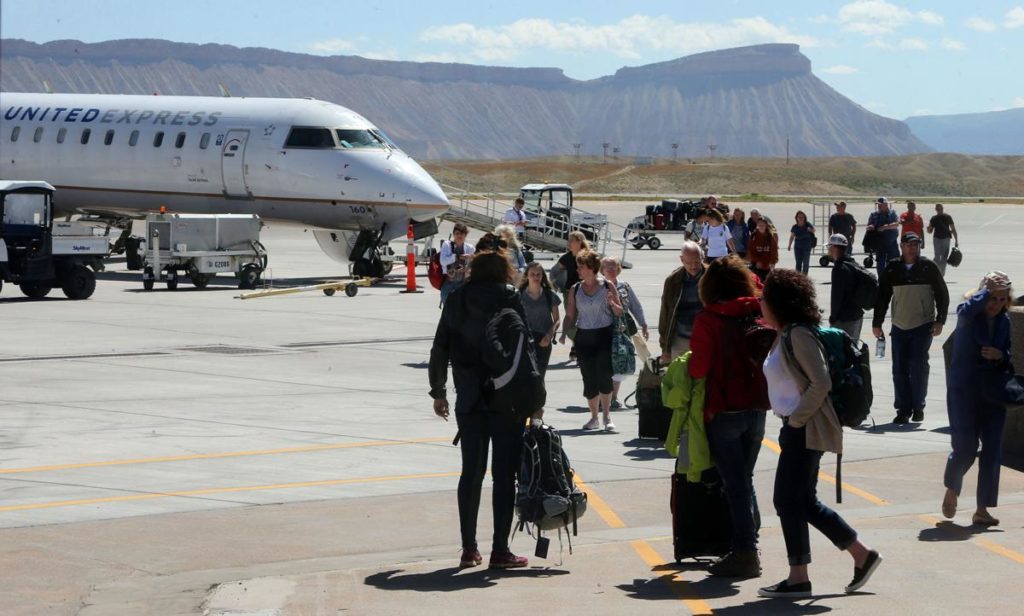New York banning gas stoves and furnaces in all new construction has not produced any reductions in global carbon emissions. More federal regulation of dishwashers and air conditioners has not done the trick. Seventeen states banning the sale of gasoline-powered cars by 2035 is apparently not enough, either. Nothing climate activists have proposed so far will bring any change in the continued growth of coal mining, power plants, and automobiles in places like China and India. So, the activists now have yet another target – airplanes.
Under the headline “The Climate War on Travel,” a climate news website highlights the short-flight ban France implemented in May – something numerous other nations including the U.S. are also eyeing. The BBC reported that “France has banned domestic short-haul flights where train alternatives exist, in a bid to cut carbon emissions.” The new French law ends all routes where the same trip can be taken by train in less than two-and-a-half hours. That essentially eliminates air travel between Paris and numerous French cities such as Nantes, Lyon and Bordeaux.
Those “short-haul” flights take less than half the time of a train trip. But obviously the convenience of travelers was not a priority to legislators who voted for the ban. Perhaps even more shocking, the new policy is popular with the public – one poll shows 41 percent of the French population thinks travelers should be restricted to only four flights in their entire lifetimes.
To the extend some politicians are considering similar rules in the U.S., Western Slope residents should be worried. Such a policy would be unpopular in the West, obviously. But it will shock nobody to learn that many national leaders are unconcerned about inconveniencing people in rural areas like Western Colorado.

Rules could be drafted differently in the U.S. than France, of course, though many of the national leaders in both countries are singing from the same hymnal these days when it comes to climate policies. Consider the flights to and from Grand Junction, where non-stops to Denver, Phoenix, and Dallas/Ft. Worth all take less than two-and-a-half hours. By contrast, the daily Amtrak train trip from Grand Junction to Denver takes more than eight hours, so although it is among the world’s most scenic trips, it is hardly a suitable substitute for people traveling on deadlines. You might think that would keep policymakers from ever considering a ban on “short-haul” flights in the U.S. You would be wrong.
Not only are such flight bans being considered, they are openly advocated by dozens of cities, including Phoenix, which would be shooting itself in the foot economically if it eliminated dozens of daily flights to other western cities. Yet its leaders have joined officials from Austin, Boston, Chicago, Houston, Los Angeles, Miami, New Orleans, New York, Philadelphia, Portland, San Francisco, Seattle, and Washington, D.C., in the “C40 Cities Climate Leadership Group.” That is the organization proposing to limit travelers to “one short-haul return flight every 3 years per person,” defined as any flight of less than 932 miles. Those cities also propose to ban privately owned cars, so good luck figuring out how to travel if you live in Western Colorado. Since the ban would apply to “short-haul return flights,” maybe that means you could leave as long as you didn’t plan to return.
Economic development leaders have spent many years working to get more flights into the Grand Junction, Montrose, Durango, Eagle, Aspen, Telluride, and Yampa Valley airports. All of them could lose everything they have worked for if such a radical scheme were to become law in the U.S. Most Americans react to such absurd plans by saying, “Oh, they couldn’t do that.”
The same reaction is expressed even today by citizens of New York, whose state leaders are banning gas stoves, ovens, furnaces, fireplaces, and barbecue grills. Most people don’t care because the ban only applies to new construction, so far. That isn’t good enough for New York’s state Senate, which has now voted 39-23 to decommission existing gas pipelines. They won’t need to take away existing gas stoves if they simply shut off the gas. They suggest “emergency powers” like those used post-911 and during COVID, based on the climate change “emergency.”
I have ignored such ludicrous ideas for years, thinking the public would never stand for it. French leaders once thought that, too, but they now face a public not only OK with the government drastically restricting travel – but demanding it. This could be our future, too, if we allow it.




Comments on this entry are closed.